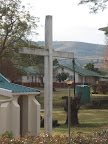 “Ed – you must leave immediately!”
“Ed – you must leave immediately!”I look up from the notes in which I am writing – it is Dr Ndlovu, the doctor from Thulasizwe. “But we are going at 3pm.”
“No – it’s all changed. BB called me and asked me to come over. They can’t use government vehicles to take you back. Benedictine Hospital in Nongoma has closed and they are afraid that the strikers will block any vehicle with government plates.”
“So what’s happening?”
“Someone has agreed to take you in a private car – but they want to get back before dark. Go!”
I find Hendy and we quickly pack. Our lift is from Adolph once again – but this time in his own Toyota Corolla. “I need the money,” he explains. We chat about the strike as we drive. I ask him about Mbheki. “Hey - he has lost the people. He has forgotten what it is like.”
“But you are ANC?” I ask. He nods.
“But here you cannot say that. This is the heart of Zululand. All these people,” he gestures to the huts we are passing on the road, “they are IFP [Inkhata Freedom Party].”
I look at the road. We have taken a different route back to the highway. The communities here are spectacularly poor. Traditional kraals dominate. We pass groups of women walking home with firewood or water on their heads. Then, rather startingly, as we drive over a river bridge I see a car parked in the river. A group of men are washing it. Adolph stops to let me take a photo. The men laugh and wave as I shout, “Siyabonga! Salani kahle!”
We hit the highway again and drive on to Nongoma. There is no evidence of strikers – the hospital is a short distance off the main road anyway. An hour later we are back at Hlabisa. It feels a little like a home coming.
“Where have you been doctor? I have missed you!” shouts one nurse.
“You made it!” says Magnus when he sees us in outpatients. It is full and busy. Welcome back…

Comments